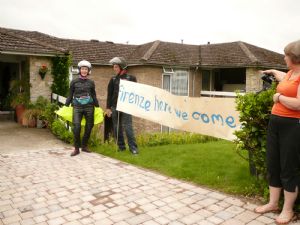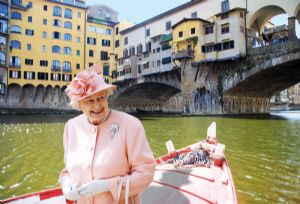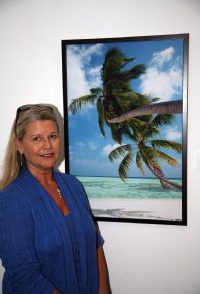Tomas Simcha Jelinek has many stories to tell. He has been living in Tuscany for the past 30 years, both in Florence and in the Chianti hamlet of Lamole,
and he is currently the manager of Ruth’s kosher and vegetarian restaurant (www.kosheruth.com), next to Florence’s
Synagogue on via Luigi Carlo Farini. A professional puppeteer, caterer,
award-winning writer and father of three, he has journeyed across Europe, has
been married twice (to the same woman!), and his life in Tuscany has included
cutting grass for Prince Charles and catering for the former mayor of Florence
in the Sala dei Cinquecento. TF’s Joëlle Edwards followed Jelinek on his
routine morning trip to the Sant’Ambrogio market, where he selects produce and
cuts of meat for the local Jewish community, as emissary to the rabbi of
Florence.
Born in post-war Czechoslovakia in the town of Sudet, where his mother
had taken refuge following deportation from the Jewish area of Munkatch, Tomas
Jelinek grew up during the communist rule of the Eastern Bloc. After a valiant
effort to follow in his grandfather’s footsteps as a railroader by studying
national rail security at college, he was encouraged (for the safety of the
nation!) to try an alternative path. Embracing his maternal genes this time, he
entered the world of theatre, a subject that his mother taught and his sister
had already studied.
Following a four-year course in theatre studies at the Prague Academy of
Performing Arts, during which he specialized in the art of puppetry, he
graduated as a master puppeteer or burattinaio,
with a particular interest in puppetry as a means of communication. He
travelled and performed around the country with fellow artists, and it was
during a show for recovering patients in a rehabilitation centre that he found
himself entertaining his future wife, Gloria Satti from Sesto Fiorentino.
Gloria had accompanied her niece to Prague for treatment after a road accident,
returning for three-month periods to supervise her progress. Tomas and Gloria
were married in a civil ceremony in Prague in February 1981, and for political
reasons moved to Italy to start their life together in December that same year.
With burattinaio-a profession not fully recognized in the Italian theatrical community-on
his ID card, Jelinek had a hard time finding work, and through connections in
Prague, the couple moved to Panzano in Chianti, to work at the residence of
psychoanalyst and writer Gianfranco Draghi, where Tomas worked on the grounds
and Gloria worked in the kitchen, following macrobiotic principles. They lived
self-sufficiently off the seasonal produce, and also met English royalty among
the splendid rural Tuscan villas so loved by the Brits.
The social circle of Draghi’s household was extensive, and in the
evenings, Tomas began to entertain the guests with his puppet shows. One night,
his work caught the eye of puppeteer Amy Luckenbach (wife of artist Swietlan
Kraczyna), who later created the theatre company Burattini a Spasso, kick-starting Tomas to tour Italy for almost 20
years on the theatre circuit with the support of his wife, who had also learned
to make the puppets. At the World Theatre Festival in Zagreb in the 1990s,
Tomas, together with two other puppet artists, delivered an award-winning
performance of Pinocchio in the constructed international language of Esperanto, communicating
the ideal of a politically neutral language and an apolitical society. Tomas’s
own theatre company was named TINDIPIC, which means theatre of a small deer,
from the word ‘Jelinek’ (small deer in Czech).
After a time in Italy, Tomas began to follow Jewish traditions more
closely. By observing the rest day, Shabbat, from sunset on Friday to dusk on
Saturday, hence refraining from certain activities that range from cooking to
performing, he had to sacrifice one of the only two days of the week-the
weekend-when he could earn money as a performing artist. In 1999, to supplement
his income and further his spiritual journey with Judaism, he left for New York
to study the Yiddissket (Yiddish Guide) at the Orthodox Union headquarters, staying
in his cousin’s apartment on a corner of Fifth Avenue, near Union Square, where
he would walk the city at night in admiration.
With his practical experience and interest in food, he qualified as a
mashgiach (Kosher food inspector) and returned to Tuscany, where he was asked
to guarantee the Kosher food both for Ruth’s and the Jewish community in
Florence, which counts approximately 1,000 members. Ten years on, he now runs
the restaurant and manages the catering for Jewish weddings and numerous other
important events in the city.
Asked what is involved in Kashering, (making Kosher) a non-Kosher
kitchen in order to prepare a Jewish reception or dinner, he explains that of
the 72 hours required to ensure the total purification (or purging) of the
environment, the first 24 involves leaving the kitchen empty, then follows 24
hours of various methods of cleaning and heating implements, stoves, sinks,
dishes and surfaces, performed by a Rabbi, then the food preparation and
cooking begins. ‘Imagine what that meant for me in New York’s Hyatt Hotel
kitchens ahead of a Jewish feast!’ he chuckles.
Jelinek celebrated his own Jewish wedding in 2004 in the synagogue of
Florence, marrying Gloria, who converted to Judaism, for the second time, some
20 years after their first wedding, with their three adult children among the
numerous guests. These days the comments spilling from Ruth’s guest books are
testament to his generous hospitality and natural talent to entertain.
FLORENCE QUICKFIRE
Where would you take a guest who
doesn’t like art?
To the Arco di San Pierino (the covered walkway between piazza San Pier
Maggiore and via dell’Oriuolo) and along Borgo Albizi. There’s a real energy of
life there.
Best bar for cappuccino and
brioche?
Although I don’t take breakfast out (where Kosher food is not
available), one of my favourite bars is Café Cibreo. It has a lovely, open
atmosphere, where you can simply relax, whilst feeling at the very heart of the
local community.
Best kids’ activity?
The playground in piazza D’Azeglio, partly because I helped create it,
as part of the Gruppo Genitori di piazza D’Azeglio. The Oblate library also
offers some interesting options for children and youth.
One place in the city that
inspires you?
I would have to say again, piazza D’Azeglio. I’ve seen it develop and
become an important part of the local community for so many. I love watching
people congregate there and enjoy the space. I am also fascinated by the inside
of the post office on via Pietrapiana. Such an ugly building on the outside but
inside there is an incredible filtering of light through the building, which is
quite mesmerizing!
Famous monument or tourist
attraction that you still haven’t visited?
[Whispering] The Uffizi! I have to admit that I would be a little
overwhelmed to be surrounded by so much Christian art.
Favourite artwork in Florence?
Folòn’s Man with Umbrella fountain on the island roundabout opposite the Obihall. I like the
paradox of the sculpture made with water of the concept of protection from
water.
Favourite Florentinism?
The word bischero (‘fool’). And the use of the word punto to mean ‘hardly’; it has a similar use to the Yiddish work pintele.
Favourite Florentine or Tuscan,
past or present?
Galileo Galilei, because of his very strong, challenging and
controversial theories. I am also a great admirer of the late writer and
journalist Tiziano Terzani.
What would you ask Mayor Renzi
over a coffee?
I would thank him for finally lighting the beautiful synagogue at night,
and I would also ask if he has considered keeping a calendar of all religious
festivals in the office to make sure that all the citizens of Florence can
enjoy and partake in the events organized in the city, that they don’t clash
with important religious festival dates.
Can’t get enough of Florence and looking for a place to stay long-term? Or are you an expat searching for a place to house all those extra guests flocking to the Renaissance city? There are many long-term and short-term holiday apartment rentals in Florence waiting for you!







